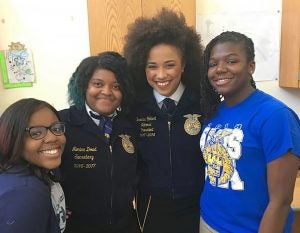Twenty minutes before the summer school bell rings, our principal shares over the loudspeaker to our Florin High School students and staff, “In remembrance of Juneteenth, the school will be closed Wednesday, June 19th.”
If I could go back in time and hear over the loudspeaker of my public high school about the history of Juneteenth and the importance of remembering the day, I wonder how much my self-efficacy as a black child would grow, knowing that my culture and its triumphs were being widely acknowledged and celebrated in my community.
I wonder how I would have felt if I hadn’t just heard it over the speaker, but in my textbooks, in the library books, speaking on the celebration in my own agricultural classes?

As the loudspeaker continued explaining the holiday and its significance to our campus, I sat envious of my students and proud of my country’s progress.
With a resurgence of notoriety in 2019, Juneteenth has been recognized as the longest-running African American Holiday. It was first recognized in 1980 and later became an official federal holiday in 2021.
Across the country, forty-nine states and the District of Columbia all recognize Juneteenth as a holiday on social media posts, public billboards, and even in performative statements from businesses. Outpores of celebration, colored in green, red, black, and yellow, dance around Juneteenth parades, family gatherings in parks, and community-funded events; a confetti cannon of song, dance, and recognition fluttering down onto the United States.
Once a proponent of the century-long enslavement of black people as a cheap, lucrative labor force, agriculture is also a space that isn’t historically perfect for black Americans but is growing, learning, and providing a space for the celebration of African American agriculturalists and community members.
Let’s take a look at how various spaces across the nation are choosing to uplift the voices of African Americans in Agriculture and the communities it serves.
Wild Wild West in Color Rodeo and Agriculture Expo: Marietta, Georgia
The Wild Wild West in Color Rodeo and Agriculture Expo is an event that educates the community about the overlooked stories and enduring legacies of the Black cowboy, cowgirl, rancher, and farmer.

The exposition is headed by two Black women rodeo athletes, Ronni Frank, and Carolyn Carter, and is sponsored by Black Rodeos USA. Their hope is to provide the attendees with a wide array of exhibits, demos, and education booths “highlighting the technologies and practices shaping the future of agriculture.”
They also added that they invite vendors to help attendees taste vibrant foods rooted in community agriculture.
Buffalo Bills Donation to Juneteenth Agriculture Pavilion: Buffalo, New York
For the last forty-nine years, Buffalo, New York, has celebrated the Buffalo Juneteenth Festival. The festival is full of music, booths, and educational set-ups, bookended by a large parade down the streets of Buffalo for the whole community to witness.
However, the celebrations move from the physical moments to the opportunities to give monetarily here in Buffalo. One of the National Football League’s official teams, the Buffalo Bills, has made it their humanitarian mission to improve accessibility to food in their community. So much so that during the Juneteenth celebrations, they supported Buffalo’s Juneteenth Agricultural Pavilion with a $15,000 grant, more than double what they donated in 2022.
Founded in 2019, the Juneteenth Agricultural Pavilion educates the public about agriculture while uplifting the voices, science, and innovations of Black farmers and entrepreneurs.
The Buffalo Bills, along with other organizational partners in Buffalo, continue to support the pavilion as they work to provide more demonstrations and educational presentations on careers in agriculture, sustainable agriculture practices, and food access.
SoulTeenth Fest-Lexington, Kentucky
Their landing page describes SoulTeenth Fest as “Kentucky’s premier Juneteenth Festival.” Making a stamp on the claim, the festival’s parent company, SoulFeast, plans to offer a wide variety of opportunities to get down with attendees. Food, art, music, agriculture, and did they say great food?
“Our mission is to curate culinary experiences as a means to educate, stimulate, and elevate Black businesses one bite at a time,” reads the event’s website.
SoulFeast doesn’t just plan to offer SoulTeenth as a way to elevate Black businesses and voices but also offers a week-long celebration on Juneteenth to highlight black-owned restaurants. They partner with black-owned restaurants to provide $12 meals all week long from all the restaurants that participate, ranging from jerk chicken tacos, catfish and grits, chicken and waffles, and an assortment of other scrumptious meals that fill the soul.
While partnering with black-owned restaurants, SoulFeast also features “Black Soil” on its festival page. Clicking on the link takes you to another area where SoulFeast features Black Farms and Farmers from all over the country, predominantly the state of Kentucky.
Whether on Juneteenth or throughout the rest of June, I encourage you to keep the vision of freedom and progress alive by finding a local offering in your area. Let’s celebrate the history and culture of the Black food, fiber, and agricultural community together!
Bre Holbert is a past National FFA President and studied agriculture science and education at California State-Chico. “Two ears to listen is better than one mouth to speak. Two ears allow us to affirm more people, rather than letting our mouth loose to damage people’s story by speaking on behalf of others.”



